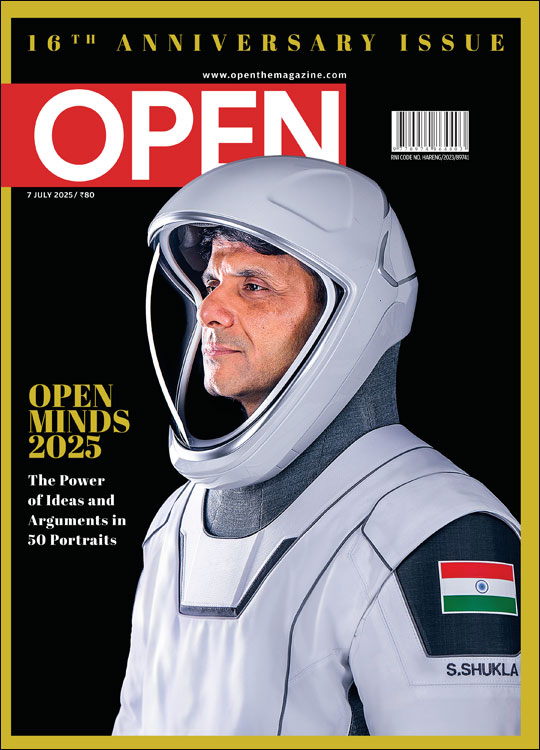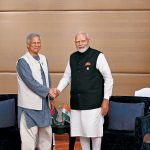Race and a Royal Wedding: A Palace Coup
A royal wedding that may redefine the monarchy
 Roderick Matthews
Roderick Matthews
 Roderick Matthews
|
10 May, 2018
Roderick Matthews
|
10 May, 2018
/wp-content/uploads/2018/05/Apalacecoup1.jpg)
POOR OLD BRITAIN, with its democratic entrails in seething crisis. A hung parliament, a minority government, Brexit recriminations, Lords against Commons—even party activists versus MPs.
And where do Brits turn for salvation when democracy fails? Instinctively we latch onto a royal wedding. Good news! Prince Harry and Meghan Markle are to tie the knot. It will boost the economy! It will bring the nation together!
Well…will it? Can it? And where will all the ballyhoo leave the institution of royalty?
Let’s start with the financial analysis, which turns out to be as confused as just about everything else right now. A top firm of ‘brand consultants’ estimates that the upcoming royal nuptials will inject £500 million into the beleaguered UK economy, but the Financial Times disagrees, saying that this May’s celebrations will do nothing for us at all. The pink thunderer points out that the last big royal bash, the wedding of Prince William and Kate Middleton in April 2011, actually had a depressive effect on the economy. The sale of mugs and tea towels was presumably outweighed by the extra bank holiday and the costs of security.
And security is going to be even more expensive for Harry and Meghan, because both are potential targets. There has always been a long queue of people who want to assassinate British royalty, and Harry’s service in Afghanistan puts him right in the frame for various groups. But because of her mixed ethnic background, Markle is also apparently in danger from race-hate groups in the way that Kate, now Duchess of Cambridge, never was. Far-right fanatics are outraged that a non-White person is marrying into the family, and word has it that they may take direct action to stop this affront to Anglo-Saxon purity.
And other costs? We have been reassured that the food and drink will be paid for by the royal family itself, which means that though the cake alone is alleged to be costing £50,000, sadly none of us taxpayers has a legitimate claim on any of it. But the security bill is a public cost that cannot be avoided. Lampposts and sewers must be inspected. Therefore, according to the Daily Express, the whole event is probably a net loss to the nation of something like £24 million.
So what about national reconciliation then—the power of royalty to heal our differences? Anecdotally, the evidence is mixed. For all the newspaper froth about Markle fever, I have at least one friend who is leaving London and heading for the farthest end of the country, to get away from the prospect of a street party his neighbours are organising. Not a scientific survey, I grant you, but it shows that the entire nation is not swept up in rapt enthusiasm.
And there’s the rub. In modern Britain, it is not possible to look at anything royal without asking deeper questions about the relevance of monarchy, and especially the outer fringes of the monarchical cabaret.
British royalty has evolved enormously over the last hundred years or so, and it is arguable that the entire business has been saved by the extraordinary devotion to duty of the current queen. If you are going to have a monarch, make sure it’s one like her.
She has been the perfect figurehead, almost as untouched by scandal as she seems to be by personal vices. Yet, behind her, Prince Philip, her long-suffering backdrop of a consort, has been guiding the modernisation of the monarchy in a bid to extend the life of ‘the family firm’ amid democratic politics and mass communication. So, our royals wear ordinary clothes; they smile for the cameras; they serve in subaltern ranks in the armed forces, and they do not flaunt their private wealth, except on state occasions when it marks out the dignity of the offices they hold. Most observers reckon Philip has done a brilliant job.
But he has not always had things his own way. The modernisation project took a terrible battering in the 1980s, as the new generation of princes—Charles, Andrew, and the other one— came up for marriage. The big snag was that there weren’t any suitable royals around for them to marry. Instead they had to choose their brides from a young cohort which had thoroughly confused royalty with celebrity.
Meghan Markle and Prince Harry have set up the first issues-based, diversity-enhancing royal marriage. The bride is a commoner, a foreigner, of ethnic minority descent (her mother is Afro-American), and a divorcee
Diana, Princess of Wales, eventually managed to pull away from that crass misunderstanding, and began to use her status to advance issues of non-political concern, like landmines and AIDS. Shunned by the inner family core after her fall-out with Charles, she became an internal royal opposition, a disruptive and unpredictable figure, belittled at home, beloved abroad. Her activities made a constructive contrast with Fergie, Duchess of York, her one-time partner in celebrity, who was swept away by the frivolity into which modern royalty can easily descend, and was hardly heard of again.
Now Diana’s outlook lives on, in the willingness of Harry, her younger son, to further promote the idea of royalty as an issues-based business. All fine and well. Doing good deeds in return for our deference has always been the basic royal deal, but that deal has always been premised on inequality. There is no way to disguise this, and the Philip strategy, of hiding royal social superiority in plain sight, has very severe limits.
If you have ever been anywhere near the British royal family you will know what a hyper-controlled world they inhabit, though it is quite possible that this may not he readily apparent to members of the Windsor clan, especially when young. Being royal is a full-time, highly protected job, and not one that disappears at the weekends or in moments of leisure. Legend has it that the Queen thinks the world smells of fresh paint.
The de-starching of royalty has been Prince Philip’s great achievement, but it was Diana who humanised it in a modern manner. She was, in Tony Blair’s bizarrely oxymoronic phrase, ‘the people’s princess’, as if popular approval creates hereditary rights. But that was over 20 years ago, and nothing stands still in modern Britain, including our relationship with the royals. Harry, developing Diana’s outlook, seems to be moving royalty into the world of issues-based identity, of public commitment to diversity. This is a risk, because while he may wish to show his good intentions, he raises a wider question: how diverse can royalty ever be?
The de-starching of royalty has been Prince Philip’s achievement, but it was Diana who humanised it in a modern manner. She was, in Tony Blair’s bizarrely oxymoronic phrase, ‘the people’s princess’
Even if he is not just cannily positioning himself, Harry has consciously decided to marry whom he wants to, and that is a piece of personal wilfulness which blue-blooded people allow themselves at their very great dynastic risk. Royal marriages used to be worked out on a genetic chessboard, taking into account ancestry, landholdings, strategic interest and international diplomacy. Now what? The royal family may feel the need to appear more relevant, or Harry may simply not be attracted to the kind of princess that older generations would have recognised as royal material. Even in the 1950s, his great-aunt, Princess Margaret, was not allowed to marry the man she chose, because he was divorced. That kind of limitation has now, it seems, disappeared.
Harry may have recognised that we have moved on from the simplistic confusion of celebrity and royalty into a more realistic, post fairy-tale era where the priority is not to fix things—it is now far beyond the power of royals to fix anything—but to be seen to care. They can’t lead us, but they can direct our attention. However, this too has its dangers.
He has chosen to marry someone who has retired from the acting profession to become a self-described ‘humanitarian’. Now, as the two of them seek out the desperate and wretched of the earth, they cannot but highlight the disparity between the happy accidents of their own birth—by descent or talent—and those of others less fortunate. Injustice comes in many forms and they risk making themselves an object case.
We are seeing an extraordinary reversal of the idea of royalty. Instead of floating semi-divine and remote above us, the royals are now among us, in parallel step, following our demographic trends. But is a constitutional monarchy actually obliged to reflect our nation, in the way we would like the House of Commons to do? Well, half the family is already made up of women—that sort of goes with the territory. But here we have a divorced, Catholic-educated, mixed heritage, non-White person moving into the magic circle.
The choice of Meghan Markle represents a bold, even revolutionary move. She and Harry have set up the first diversity-enhancing, issues-based royal marriage. The bride is a commoner, a foreigner, of ethnic minority descent (her mother is Afro- American), and a divorcee. That is some provenance. Anyone less likely to marry a royal would have been hard to find—till now. She has the universal qualification that she is good looking, and I have no doubt that personally she is pleasant, empathic and liberal. But none of those things has any historic connection with royalty.
We can reasonably demand that our civil service and our boardrooms should look like our society, and should reflect our differences; say, 50 per cent female, 15 per cent Black minority ethnicity, 10 per cent gay. But what if you do that to royalty, which is based, of course, on privilege and exceptionalism? Is that a remotely sensible thing to do—to put demography above heredity, and identity above hierarchy? It risks establishing a new doctrine—the Divine Wrong of Kings. They, not we, are at fault suddenly, if they seem insufficiently representative.
Even someone like Queen Elizabeth II, who may seem to have uncommon qualities, actually only has common qualities to an uncommon degree. What is truly uncommon about her is her willingness to serve
Harry has form as a genuine pioneer. He has taken considerable personal risks already in his efforts to highlight the curse of depression, and has effectively admitted that growing up royal is bad for one’s mental health. Royals were supposed to cope with the things we couldn’t—leadership, bravery, self-sacrifice, close acquaintance with God. Now we have been told by an insider that this is not the case. With political roles no longer available to them, they are left with little more than their potential to care more than we do. This puts British royal culture at the cutting edge, but that edge may yet prove dangerously sharp. Interestingly, Philip is rumoured to be vigorously opposed to the match.
What of the future, then? Politically, the monarchy is probably safe. It is extremely unlikely that any British government will abolish our most venerable institution, mostly because no one is convinced that they have anything better to put in its place. Inveterate republicans do exist, some in the senior ranks of the Labour party, but they are a small minority, and political big hitters will always be reluctant to replace an unelected monarch with an elected president. Why? Because no self-respecting prime minister would ever set up a rival mandate. This is largely what has preserved the House of Lords into the twenty first century, despite left wing fulminations for generations; the Commons will not lightly set up a truly democratic, alternate body. When House of Lords reform did come, under the Blair government, it was solely a matter of replacing hereditary peers with appointed ones. The robes remained, as did the opportunity for governments to use peerages as rewards.
The political danger to royalty is not from outside, but from within. The heir to the throne, Charles, is believed to favour a model of monarchy that is neither Philip’s nor Diana’s. He wants a proper role for himself, as an activist ruler, defending faith, minorities and the environment. He has been privately writing to ministers for years, offering his advice and guidance. Heaven knows where that will land us all. The last British monarch who wanted to ‘be a king’ was George III, over 300 years ago, and his most notable personal achievement was losing the American colonies. But times were different then, and he managed to stay in the job for 60 years. His recent descendant, Edward VIII, who also harboured designs to revive active monarchy, was eased out within a year by senior politicians who would tolerate no such kingly ambitions.
The danger to monarchy is not primarily political, it is social, and it is likely to be a slow slide into irrelevance and faint ridicule, not a swift moment of revolt. The question is, where does an issues-based concept of royalty fit? What happens when the royals are like us, when they feel obliged to reflect us? A major line will be crossed if they strive to be more like us and we stop striving to be more like them. How, in the end, will they be able to keep up?
Old school racists used to chant ‘There ain’t no Black in the Union Jack’, which was neither nice nor grammatical. There isn’t, but there is a strong possibility that there will shortly be some in the royal family. The arrival of a Brown baby in Buck House could prove to be a more revolutionary step even than deposing the current queen.
Amid the fun and frolics, ‘the firm’ must remain wary. All this exposure, driven by a self-conscious desire to deserve royal privilege, is a trend it will be impossible to reverse. It may be a fatal mistake to let so much daylight in on such fragile magic, because it is likely to illuminate only banality, or worse. Royals are just human. Even someone like Queen Elizabeth II, who may seem to have uncommon qualities, actually only has common qualities to an uncommon degree. What is truly uncommon about her is her willingness to serve.
Last time a royal let their heart rule their head in Britain, we got Wallis Simpson and the abdication crisis of 1936. So what do we have in 2018? A stroke of genius—a PR coup of such audacity that it redefines monarchy as a kind of people power? Or will we rally round a forward-looking prince, who feels only a limited loyalty to the idea of royal exceptionalism? Or is this all just a giant step nearer to the end of the line?

/wp-content/uploads/2025/06/Cover-OpenMinds2025.jpg)













More Columns
Indian Companies Have a Ransomware Vulnerability Open
Liverpool star Diogo Jota dies in car crash days after wedding Open
'Gaza: Doctors Under Attack' lifts the veil on crimes against humanity Ullekh NP